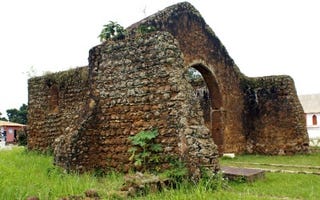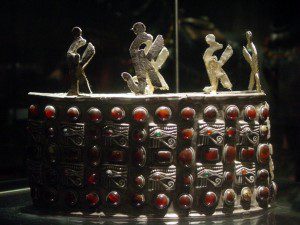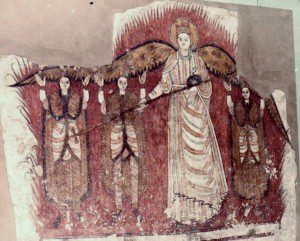Welcome to our Community
Wanting to join the rest of our members? Feel free to Sign Up today.
Sign up
It's a shame they don't teach the history of African Christianity at Black Israelite school.telling black people they are fake christians if they are Catholic ("Roman Catholic, youve never been to Rome!!")
Because, actually....
And then, a thousand years later, but still before the discovery of America....[Lost Christian Nubia
"The Christian faith arrived here no later than the fourth century, and the great patriarch Athanasius consecrated a bishop in the region. Nubia survived as a Christian kingdom from the sixth century through the fifteenth, dominating the Nile between Khartoum and Aswan, and straddling the modern-day border of Egypt and Sudan. Nubia’s churches and cathedrals were decorated with rich murals in the best Byzantine style, showing their dark-skinned kings in royal robes. Its main cathedral at Faras was adorned with hundreds of paintings of kings and bishops, saints and biblical figures – images that lay forgotten under the sands until rediscovered in the 1960s."
"This Christian state became a major player in African politics. In 745 its king invaded Egypt, with the goal of defending the patriarch of Alexandria:
And there were under the supremacy of Cyriacus, king of the Nubians, thirteen kings, ruling the kingdom and the country. He was the orthodox Ethiopian king of Al-Mukurrah; and he was entitled the Great King, upon whom the crown descended from Heaven; and he governed as far as the southern extremities of the earth.
By the 830s, the patriarch of Alexandria “appointed many bishops, and sent them to all places under the see of Saint Mark the evangelist, which include Africa and the Five Cities and Al-Kairuwân and Tripoli and the land of Egypt and Abyssinia and Nubia.”
The Nubians signed a treaty, a “pact,” with Islamic Egypt, which both sides respected for an impressive six centuries.
"
But Nubia’s fortunes deteriorated in the later Middle Ages, with the rise of the great Mamluk regime in Islamic Egypt. In 1275, the ferocious sultan Baybars conquered Christian Nubia, capturing its capital, Dongola. His forces sacked churches and forced the king, David, into exile. Repeated attacks weakened the state, while the growing crisis of the Egyptian church prevented Coptic authorities from supplying the bishops and priests essential to maintaining church life. By 1320, the royal church in Dongola had become a mosque, and around 1372, we hear of the ordination of the last Christian bishop.
Within a few decades, Nubia was both dechristianized and Arabized in language and culture, although a tiny Christian statelet lingered on until the late fifteenth century. At some unknown point – around 1500, perhaps? – some unknown church must have celebrated the land’s very last Good Friday liturgy, its final Easter service. The last Christians probably vanished around the time that Europe began its Reformation.
Sixteenth-century travelers were told that Nubia’s Christians
had received everything from “Rome” [i.e., Constantinople] and that it is a very long time since a bishop died whom they had received from Rome. Because of the wars of the Moors, they could not get another one, and they lost all their clergy and their Christianity and thus the Christian faith was forgotten."
https://www.theroot.com/a-forgotten-african-catholic-kingdom-1790865260

A year before Columbus set sail for America, an African king was baptized and converted his kingdom into a Catholic nation that lasted nearly 370 years. King Nzinga a Nkuwu, ruler of Kongo, located in what is now northern Angola, decided to become a Christian not long after Portuguese mariners reached his shores in 1483. He was baptized in May 1491, became João I Nzinga a Nkuwu, and many of his noble followers followed suit. But when he died, two brothers contested the throne, one of whom, Afonso Mvemba a Nzinga, represented a Christian party and the other, Mpanzu a Kitama, opposed both Afonso and Christianity.
In the war the brothers fought, Afonso and the Christian party triumphed. Our only account of the war comes from the pen of Afonso, and therefore has an inevitable bias, but according to him, when the greatly superior forces of Mpanzu a Kitama were about to render a final assault against him in the square of Mbanza Kongo, the country's capital, they suddenly broke and ran, giving Afonso a surprising victory. When Afonso interviewed the survivors of the battle, he learned that they had been frightened by the appearance of a heavenly force of five horsemen led by St. James the Greater.
Afonso was so moved by this miracle that when he designed a coat of arms of the country, he included five arms holding swords to represent the events of that day. The coat of arms that appeared on seals on letters, on royal regalia and in the throne room continued in use until King Pedro V swore vassalage to Portugal in 1859.
St. James' Day, the 25th of July, was Kongo's national holiday, as much in memory of the king and his victory as it was of the Portuguese saint. Every year the day was celebrated with feasting and military reviews, and people crowded in from the countryside to Mbanza Kongo and some of the provincial capitals to revel and to pay their taxes. Mbanza Kongo, which still exists as a medium-size provincial capital in northern Angola, continues to celebrate the day, now called a "cultural celebration," which lasts from July 20 to 25.
Afonso did much more than create a coat of arms and a holiday, though. He devised the institutional framework for the growth of the Catholic Church into a lasting part of Kongo culture that reached from the capital, with its dozen churches, to remote country villages. His son, Henrique, became the first bishop of Kongo in 1518, and along with his father, Portuguese priests and educated Kongolese, created a marriage of African spirituality and Catholicism that would be the distinctive feature of its religion.
Kongo's Christianity did not break completely with its older religious tradition. The Kongo High God, Nzambi a Mpungu, became identical to the Christian God, and thanks to a number of apparitions and miracles, many local territorial deities became incorporated into Catholic saints.
The ancestors, venerated as active spiritual forces in Kongo as everywhere in Africa, were given a special place in the religion, and All Hallows' Eve (Halloween) was dedicated to them. On that day, Kongolese gathered at the graves of their family ancestors, kept an all-night vigil with lighted candles and prayed for them. In the morning, All Souls' Day, they heard Mass.
Even magical charms, physical items into which spiritual forces were compelled or cajoled to enter, were integrated. Such charms were called nkisiin Kikongo, the national language, and religious literature in Kikongo used the term or variants of it to mean "holy" so that the Bible was nkanda wakisi(either holy book or charm in book form, depending on how you choose to translate it), and a church was nzo wakisi (holy house or charm in the form of a house). Christian priests, like their traditional religious counterparts, were called nganga.
Not everyone was happy with this arrangement. When the Portuguese persuaded the Vatican to give them the right to appoint bishops to Kongo's church, the bishops, always Portuguese, refused to ordain enough Kongolese priests to run the church. The kings of Kongo appealed to Rome and, in a compromise, agreed to allow the functions usually performed by parish priests to be done by Capuchin missionaries, mostly from Italy, a country considered neutral in Europe. These priests were militant followers of the Counter-Reformation, a movement within the Catholic Church dedicated to wiping out, among other things, the folk Christianity that did not fit into their revised vision of the Christian religion.
These Capuchin priests took their campaign with them to Kongo and literally made war on the practices of Kongo associated with the traditional religion. They wrote lurid accounts describing these practices as diabolical and burned all manner of "idols." But they made little impact on the religion.
When Kongo was deprived of clergy by the Portuguese bishops, they turned to the laity, and noblemen, educated in the country's schools, served as the prime interpreters and teachers of religion. These mestres de escola, as they were called in the official Portuguese documents of Kongo, continued the tradition, and the Capuchins were relegated to performing the sacraments, since these could be done only by priests. Capuchins wrote in their reports of performing tens of thousands of baptisms and thousands of marriages and confessions during grueling tours of parishes. They taught and they preached, but they could not force the religion to change.
If Kongo resisted Portuguese attempts to enslave its people, unfortunately, it also engaged in the practice through civil war. Succession to Kongo's throne was often hotly contested, and the country's history was littered with internecine conflict. In such wars, the losers, branded as traitors by the victors, were often sold to slavery wholesale.
These wars became frequent in the 1600s, and after 1665, when a succession crisis was triggered by a military setback on the Kongo-Angola frontier, civil war became a near-permanent fixture of Kongo's history. Thousands and tens of thousands of losers in this endless struggle for the throne were captured and exported to French, English, Dutch and Portuguese shippers and spread all over the Americas.
About 1 in 5 Americans of African descent come from Kongolese stock, with the greatest percentages being concentrated in South Carolina and Louisiana. They carried their religion with them, as well; the Stono Rebellion in 1739, the largest slave uprising in the U.S. before independence, was led by Kongolese Catholics anxious to escape slavery in Protestant South Carolina to freedom in Catholic Florida.
In some parts of the Americas, Kongolese actually created their own missionary activity. George Christian Andreas Oldendorp, a Moravian missionary, reported that Kongolese slaves in the Virgin Islands baptized and catechized incoming slaves from non-Christian Africa; the Brazilian Inquisition examined the activities of Pedro Congo, who dressed in priestly garb and said Mass to a congregation drawn mostly from non-Christian parts of Africa.
This complex story reveals an important aspect of the African-American past: that 20 percent of African Americans descend from Africans who came to these shores from a region that had sustained its own version of Christianity for four generations before the first Africans arrived in Virginia. In Kongo's case, internal dissension as much as European activities and demands led to massive enslavement and deportation. Twentieth-century colonialism erased the kingdom.
1
1372
Guest
Love that song... Surprised this thread got you homos riled up....Way too busy.
Anyways...Lighten up
View: https://youtu.be/83Y2hv-3UCM
1
1031
Guest
This Nathan Phillips dude is being interviewed on NPR right now. I'm still not positive that he's aware there are multiple videos of the incident. Spinning your version of the events to fit your narrative is considerably more difficult when those who want to know exactly what happened can simply watch the video. But he gets an "A" for effort - he's still trying to drive that bus.
Last edited:
A real shame since it casts a shadow over his good credentials. This polarization fucks everything up.This Nathan Phillips dude is being interviewed on NPR right now. I'm still not positive that he's aware there are multiple videos of the incident. Spinning your version of the events to fit your narrative is considerably more difficult when those that want to know exactly what happened can simply watch the video. But he gets an "A" for effort - he's still trying to drive that bus.
Always have a whacking stick handy.He better not try that shit on me,
Damn abbo
D
Deleted member 1
Guest
Where did KFCThighjiujitsu go? So funny when the truth comes out on all these things he is nowhere to be found lol. Must suck to be him and Gusto. Trump lives in their head 24/7, they are almost always posting stories that come back to bite them or have no real substance lol. Got to give it to them, they keep trying. I guess having a great economy etc etc etc only allows them to find the little shit stories that cnn and friends to try find to continue their hate trump/hate America 24/7.
Gotta love a pro gay sharia proponent and a social worker talking down to poor people.Where did KFCThighjiujitsu go? So funny when the truth comes out on all these things he is nowhere to be found lol. Must suck to be him and Gusto. Trump lives in their head 24/7, they are almost always posting stories that come back to bite them or have no real substance lol. Got to give it to them, they keep trying. I guess having a great economy etc etc etc only allows them to find the little shit stories that cnn and friends to try find to continue their hate trump/hate America 24/7.
Representin’ Baby! How many people over there have asked you “who the fuck are the Louisville Cardinals?”
For you to FREE VUTU!!
View: https://www.facebook.com/ErnestTheIron/videos/2049479095166437/
I'm confused about the context of the whole thing.
Catholics, Black Israelites (?), and Native Americans all at what protest? For what?
Chief fucken instigator, he's lucky that kid had not been thru his right of passage and earned his whacking stick yet
Check this guy out
he loves attention
He is in Skrillex and Jr Gong Marley video lol
View: https://www.youtube.com/watch?time_continue=10&v=BGpzGu9Yp6Y
@Splinty
 @jason73
@jason73
@ everyone
he loves attention
He is in Skrillex and Jr Gong Marley video lol
View: https://www.youtube.com/watch?time_continue=10&v=BGpzGu9Yp6Y
@Splinty
@ everyone












